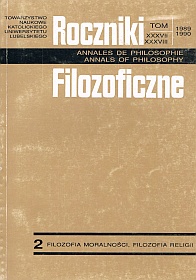O Leszka Kołakowskiego interpretacji religii
Abstrakt
The paper attempts at an all-embracing characteristic of L.Kołakowski's interpretation of religion which religion he takes as a socially accepted cult of eternal reality. Thus comprehended religion should be, according to Kołakowski, clearly distinguished from science in its rationalistic and functional meaning, when science is meant to be a tool of subjecting the world to man. Religion then is a non-rational way of taming reality which is being realized not within the domain of science but myth. Myth involves the whole man, making the sense of his life relative to mythical reality; it demands total faith and acceptance of its requirements, and does not allow for any attempt of their rational justification. However, according to Kołakowski, one can find the presence of myth in any human activity, including the typically rational.
Among various forms of myth, religion plays a particularly important and positive role, since it expresses the deepest human need of the existing someone who, while transcending the mundane dimensions, would make the world senseful, and at the same time would be a support for man and a living partner of the dialogue of love. In this manner Kołakowski criticizes any attempts at a rational justification of the existence of God (esp. the "five ways" of St. Thomas) and His attributes. He accepts, however, the postulate of God which postulate is "justified" by the mythic structure of human consciousness. Thus comprehended religion is an essential element of culture and it protects culture against the danger of secularization.
Kołakowski's interpretation of religion emerges from his basic philosophical option. Its element is, among others, a narrow, quasi-scientistic understanding of reality which understanding does not allow Kołakowski t o "place" within its framework the philosophy in general and the philosophy of God in particular. Hence his interpretation of religion is burdened with the Kantian agnosticism and Marxian functionalism.
Copyright (c) 1990 Roczniki Filozoficzne

Utwór dostępny jest na licencji Creative Commons Uznanie autorstwa – Użycie niekomercyjne – Bez utworów zależnych 4.0 Międzynarodowe.





